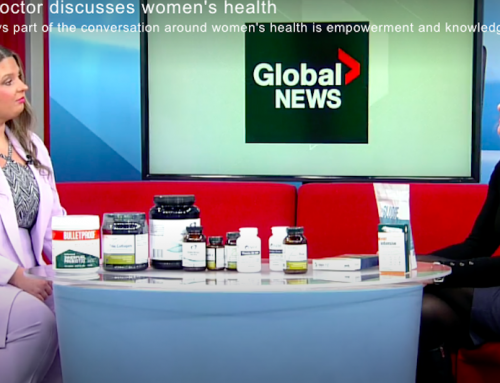As naturopathic doctor Michelle Marcoux‘s fertility-focused practice grows, it has occurred to her that she says a lot of the same things to the patients she supports. Fertility is by far her favourite area of practice and she is passionate about helping people achieve their fertility goals.
This week, she shares the top 3 things you can do in your everyday life to support your fertility health. These are things she tends to tell most everyone that comes through her door:
The Top 3 Ways to Optimize Your Fertile Years (and why you may have more time than you thought)
Given that many women have begun to delay pregnancy well into their 30’s, it’s no surprise that age and fertility is a hot topic these days.
Many articles cite a significant decline in fertility for women between the ages of 27 and 30, continuing on into one’s 30s. Historically, 35 is that “scary” age where women have been led to feel it may be too late for them to conceive at all. But recent research has shown that much of this information is based on outdated fertility statistics, going back as far as the 1600’s.
Fertility data for the present day is somewhat limited, but available information tells us that we may not need to worry so much after all. More recent data seems to indicate that the decline in fertility as one approaches age 35 is much less significant than previously believed. In fact, it would seem that most healthy women can bear children well into their 30s and that the age we should be concerned about declining fertility is more like 40, not 35. So take a deep breath ladies, we have more time than we thought.
In order to optimize the time you do have, it is vital to stay healthy and hormonally balanced. Eating well, exercising, and maintaining a healthy weight are things most everyone knows to do. But there are some other, simple things you may not have considered that can make a big difference in the health of your endocrine system, and hence your overall fertility.
The top 3 ways to keep your hormones happy well into your fertile 30’s:
1. Don’t Fear Fat!!

Fats have been given a bad rap in the past, but the truth is, fat does not make you fat. In fact, fat is essential for most processes in your body, including hormone function – after all, hormones are made of fats! Aim to have a generous amount of healthy fat with every snack and meal:
- Organic, grass-fed butter or ghee
- Coconut oil or full fat coconut milk
- Olives and olive or grapeseed oils
- Raw nuts and seeds or nut/seed oils (do not heat these)
- Avocados and/or avocado oil
- Cold water fish such as salmon, mackerel, sardines, and trout
- Grass fed beef tallow or pork lard (chose these less often but consider having them in moderation – they are great hormone builders)
- Avoid the following fats, which are highly processed and contain little to no health benefits. Some can even contribute to poor health by creating inflammation in the body:
- Corn, soybean, cottonseed, canola or safflower oil3.4
- Margarine
- Non-organic butter
- Fried foods and trans-fats
2. Get The Sugar Out.
Sugar packs a lethal 1-2 punch when it comes to your health. Not only is it void of nutritional benefits, but it also depletes minerals from your body as it is digested. Mineral depletion leads to abnormal functioning in many areas of your body, including your hormones. Sugar also contributes to inflammation and abdominal weight gain, both of which can cause abnormal hormone secretion and lead to decreased fertility.
Eliminating sugar includes things like white flour, other refined grains, and refined sugar in all its forms. If you have a sweet craving, stick to treats that are sweetened with fruit, honey, maple syrup, figs, or dates in moderation. These sweeteners have more nutrients and are less likely to contribute to inflammation.
3. Re-Mineralize.
Minerals are a key component of a healthy diet. Not only do they make up the structure of your body as your bones, but they are also needed to run nearly every system and process your body undertakes to keep you functioning. Most of us are mineral depleted to some degree. Sugary and processed foods deplete our mineral stores. Soil is less mineral rich than it used to be, resulting in food with fewer minerals. Chronic stress causes us to use up our minerals at a rapid rate. The good news is that you can replenish with some strategic dietary changes:
 Include lots of leafy green veggies in your diet – spinach, kale, cabbage, broccoli, brussel sprouts, and romaine lettuce to name a few. Not a fan of the leafy greens? Buy some frozen spinach or kale and add it to soups, sauces, smoothies, and scrambled eggs. It won’t change the taste, but it will increase your mineral intake. Aim for 2-4 servings per day.
Include lots of leafy green veggies in your diet – spinach, kale, cabbage, broccoli, brussel sprouts, and romaine lettuce to name a few. Not a fan of the leafy greens? Buy some frozen spinach or kale and add it to soups, sauces, smoothies, and scrambled eggs. It won’t change the taste, but it will increase your mineral intake. Aim for 2-4 servings per day.
Start making bone broth. It’s easier than it sounds and it is the single best way to increase your daily mineral intake. Here’s how:
- Buy a raw or roasted chicken. Cook it if it’s raw, and then eat it.
- Save the bones, skin, and other inedible parts. Throw them into a slow cooker with some carrots, celery, and onions.
- Add water to fill the pot, salt to taste, and 1-2 tbsp apple cider vinegar. Cook on low for 1-2 days or until the small bones are soft and crumble when pressed.
- Strain and freeze in jars or ice cube trays.
- Add to sauces, use to make soups and stews, or for cooking grains and beans. Aim to get some broth in your diet every day.
You can also do this with turkey, fish, lamb, and beef. Ask your butcher for bones if you are having trouble finding them.
If you find you aren’t getting the results you expected, consider booking a visit to go over your whole health history and ensure you are as prepared as you can be for your fertility journey.
References
http://m.theatlantic.com/magazine/archive/2013/07/how-long-can-you-wait-to-have-a-baby/309374/
http://www.examiner.com/article/experts-dispel-diet-myths-eating-fat-doesn-t-make-you-fat
http://www.shape.com/healthy-eating/10-foods-cause-inflammation
http://ca.shine.yahoo.com/blogs/shine-on/corn-safflower-oil-linked-increased-risk-heart-disease-171738979.html
http://www.ewg.org/research/dirty-dozen-list-endocrine-disruptors
http://www.asrm.org/Abnormal_Body_Weight/






